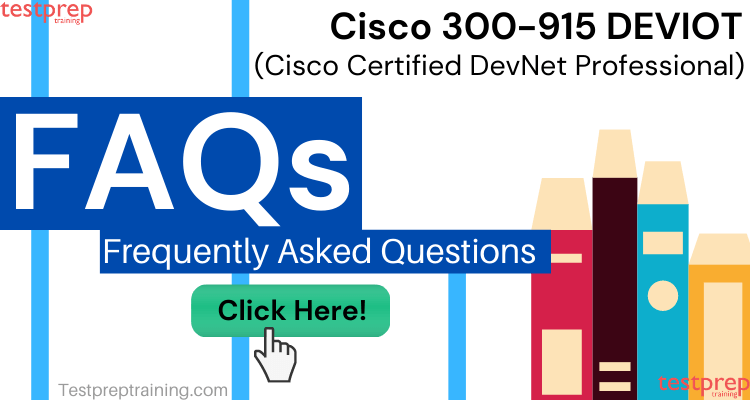300-915 DEVIOT: Cisco Certified DevNet Professional
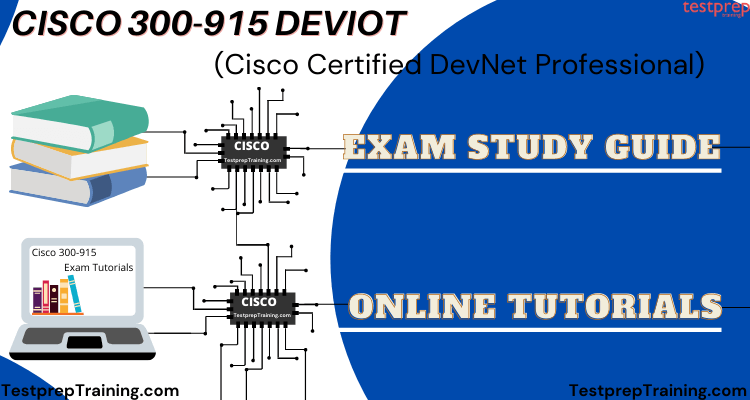
Cisco 300-915 DEVIOT exam is associated with the Cisco Certified DevNet Professional and Cisco Certified DevNet Specialist – IoT certifications. This exam examines the candidate’s knowledge and skills of IoT application development as it pertains to the Cisco IoT edge compute and network architecture. Further, this also includes Cisco IOx and Cisco EFM, IoT Data Visualization, and security methods. In this, candidates will learn about:
- Using network programmability and automation to streamline applications for reducing data size and complexity and strengthen security protocols.
- Enhancing knowledge and experience in maximizing MQ Telemetry Transport (MQTT) protocol for lower power usage, faster data transmission as well as more agility in device usage.
Knowledge required for the exam
Candidates applying for the exam must have:
- Basic software development or coding skills
- General functional and object-oriented programming skills
- Basic understanding and knowledge of where applications live and the process of deploying them in real-world scenarios
- Basic Linux OS skills for installing code language dependencies, installing code libraries, and general scripting
- Understanding of how to store code using git or another Version-Control System (VCS)
Target Audience
Cisco 300-915 exam is designed primarily for network and software engineers who are interested in learning about automation and programmability. This also includes candidates having the following job roles:
- Consulting systems engineer
- IoT Designer
- Network administrator
- Network engineer
- Sales engineer
- Network manager
- Systems engineer
- Technical solutions architect
Exam Objectives
Cisco provides trainings courses in which after taking the course for 300-915 DEVIOT, candidates should be able to:
- Explain the fundamentals of Cisco IoT and list common devices involved with listing the common protocols, standards, and data flows of IoT
- Describe the Cisco IoT, common needs, and the corresponding solutions
- Describe how programmability can be used for automating and making operations, deployment, and support of Cisco IoT more effective
- Explaining common Cisco IoT applications and how they apply to Cisco IoT use cases
- Explaining the use cases for Cisco security applications and Cisco IoT
Exam Details
For Cisco 300-915 DEVIOT exam, candidates will get a time duration of 90 minutes to complete the exam. The exam can contain various questions types that can be Multiple-Choice Single Answer, Multiple-Choice Multiple Answer & Drag and Drop Fill-in-the-Blank & Testlet. However, for passing scores, Cisco does not publish exam passing scores because exam questions and passing scores are subject to change without notice. This exam is available in the English language and the cost of the exam is $300 USD. This exam is valid for three years.
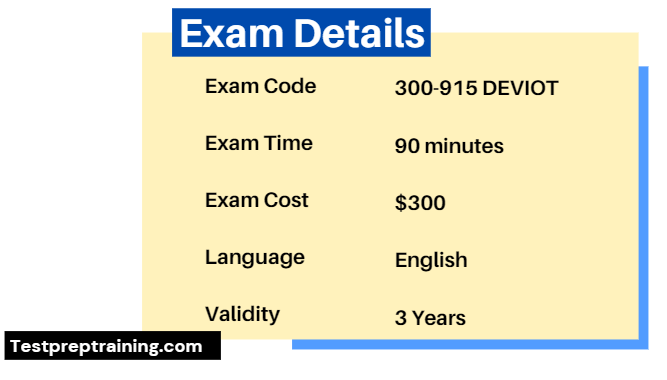
Exam Scheduling
For Cisco 300-915 DEVIOT exam scheduling, candidates have to follow some steps that are:
- Log into your account at Pearson VUE.
- There, select the Proctored exam and enter the exam number, 300-915.
- Follow the prompts to register.
After that, once you have successfully scheduled your exam appointment, a confirmation email will be sent with your appointment details and important things to know for the exam.
Course Structure
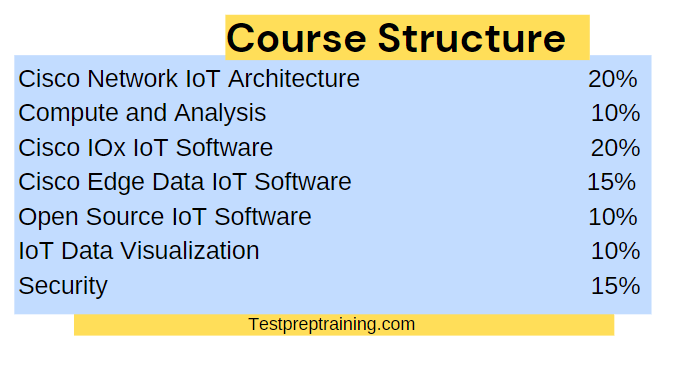
Topic 1: Cisco Network IoT Architecture
1.1 Interpreting the data flow of a topology that includes:
1.1.a gateways
1.1.b access points
1.1.c firewalls (including industrial firewalls)
1.1.d routers
1.1.e switches
1.2 Explain the purpose, functionality, and use of these operational technology components:
1.2.a PLCs and operations
1.2.b embedded microcontrollers
1.2.c RTOS systems
1.2.d Cisco interfaces (serial, sensors, I2C, and USC)
1.2.e communication protocols (BLE, WiFi, Ethernet, and LoraWAN)
1.2.f communication standards (DDS, OPC UA, MT Connect, and Open PLC) (Cisco Reference: Communication Standards)
1.3 Describing IoT requirements related to networking and device configuration policies (including configuring IOS commands for enabling IOx, port and protocol needs of an application, and security and prioritization of data)
1.4 Constructing a workflow to connect a sensor
1.5 Troubleshooting sensor connectivity issue
Topic 2: Compute and Analysis
2.1 Comparing the characteristics, capabilities, and use of edge devices to generic compute devices (Cisco Reference: Five components of IoT edge devices)
2.2 Determining the use of cloud or specific edge devices for a given application scenario
2.3 Analyzing application resource usage information to determine any required changes to the application or hardware
2.4 Constructing a Python script to deploy an application at the edge using FND and GMM APIs
2.5 Troubleshooting application resources usage and network connectivity issues when using FND and GMM APIs (Cisco Reference: GMM Overview, Generate API keys)
2.6 Determining data handling procedure and action to take with edge data based on business requirements
Topic 3: Cisco IOx IoT Software
3.1 Explain the capabilities of a Cisco IOx application (Cisco Reference: Cisco IOx Data Sheet)
3.2 Troubleshooting a Dockerfile for Cisco IOx (Cisco Reference: Docker Tooling for IOx Application Development)
3.3 Describing the process to build applications for Cisco IOx (Cisco Reference: IOx, Application Capabilities)
3.4 Identifying the troubleshooting approaches for a deployed application for Cisco IOx (Cisco Reference: Troubleshoot IOX Applications which is Unable to Start or Unexpectedly Halts)
3.5 Describing the process to deploy an Cisco IOx application into a CI/CD on platforms (such as FND, Kinetic GMM, or Directly to IOx) (Cisco Reference: GMM Overview, IOx)
3.6 Constructing a Cisco IOx application to meet requirements given SDK documentation
Topic 4: Cisco Edge Data IoT Software
4.1 Describing characteristics of edge data services (Cisco Reference: Cisco Edge Intelligence)
4.2 Analyzing a DSLink (extracting data from a sensor) (Cisco Reference: DSlink Development)
4.3 Identifying the process to send data to a public cloud provider
Topic 5: Open Source IoT Software
5.1 Evaluating the flow and processing of data from sensor to cloud in a given scenario
5.2 Comparing characteristics and usage of MQTT and AMQP (Cisco Reference: Using MQTT at the edge, Integrating with AMQP)
5.3 Determining the output from given messages and subscription details
5.4 Identifying broker QoS level for messages in a given scenario
5.5 Diagnosing issues with broker deployment and application connection
Topic 6: IoT Data Visualization
6.1 Explaining the characteristics and capabilities of data visualization tools (such as Freeboard, Grafanna, and Kibana)
6.2 Identifying the data visualization technique to meet business requirements
6.3 Interpret visualized data
Topic 7: Security
7.1 Identifying methods to implement a secure software development life cycle (Cisco Reference: Secure Development Lifecycle)
7.2 Identifying methods to secure an application and infrastructure during production and testing in a CI/CD pipeline
7.3 Describing risk management (including security challenges in IT and operational technology)
7.4 Explain the concepts related to confidentiality, integrity, and availability
7.5 Describe the capabilities of:
7.5.a ISE and ISE integration
7.5.b pxGRID (Cisco Reference: pxGrid)
7.5.c AMP for Endpoints proxy (Cisco Reference: AMP for Endpoints Deployment Methodology and Best Practices)
7.5.d Cisco Tetration (Cisco Reference: Application-First Security)
7.5.e StealthWatch (Enterprise and Cloud) (Cisco Reference: Stealthwatch Enterprise)
7.5.f Cisco Cloudlock (Cisco Reference: Cisco Cloudlock)
Exam Policies
Cisco provides exam policies for helping candidates to understand the terms and procedures for the certification exam. Some of them include:
Exam Retake Policy
Cisco exam retakes policy explains if candidates fails an Associate, Professional, Specialist, or CCDE Written exam must have to wait for five calendar days, beginning the day after the failed attempt. However, if passed then, a candidate must wait for a minimum of 180 days before taking the same exam with an identical exam number.
Exam Reschedule Policy
Candidates who want to reschedule their online proctored exam must contact Pearson VUE or access an online Pearson VUE account until the scheduled start time of your appointment. However, failure to reschedule before your appointment time or failure to appear for your appointment will result in the forfeiture of your exam fee.
Cancellation Policy
To cancel online proctored exam candidates must contact Pearson VUE or access your online Pearson VUE account to cancel your exam up until the scheduled start time of your appointment. However, failure to cancel before your appointment time or failure to appear for your appointment will result in the forfeiture of your exam fee.
For More Query Visit: Cisco 300-915 DEVIOT Exam FAQs
Preparation Guide for Cisco 300-915 DEVIOT Exam
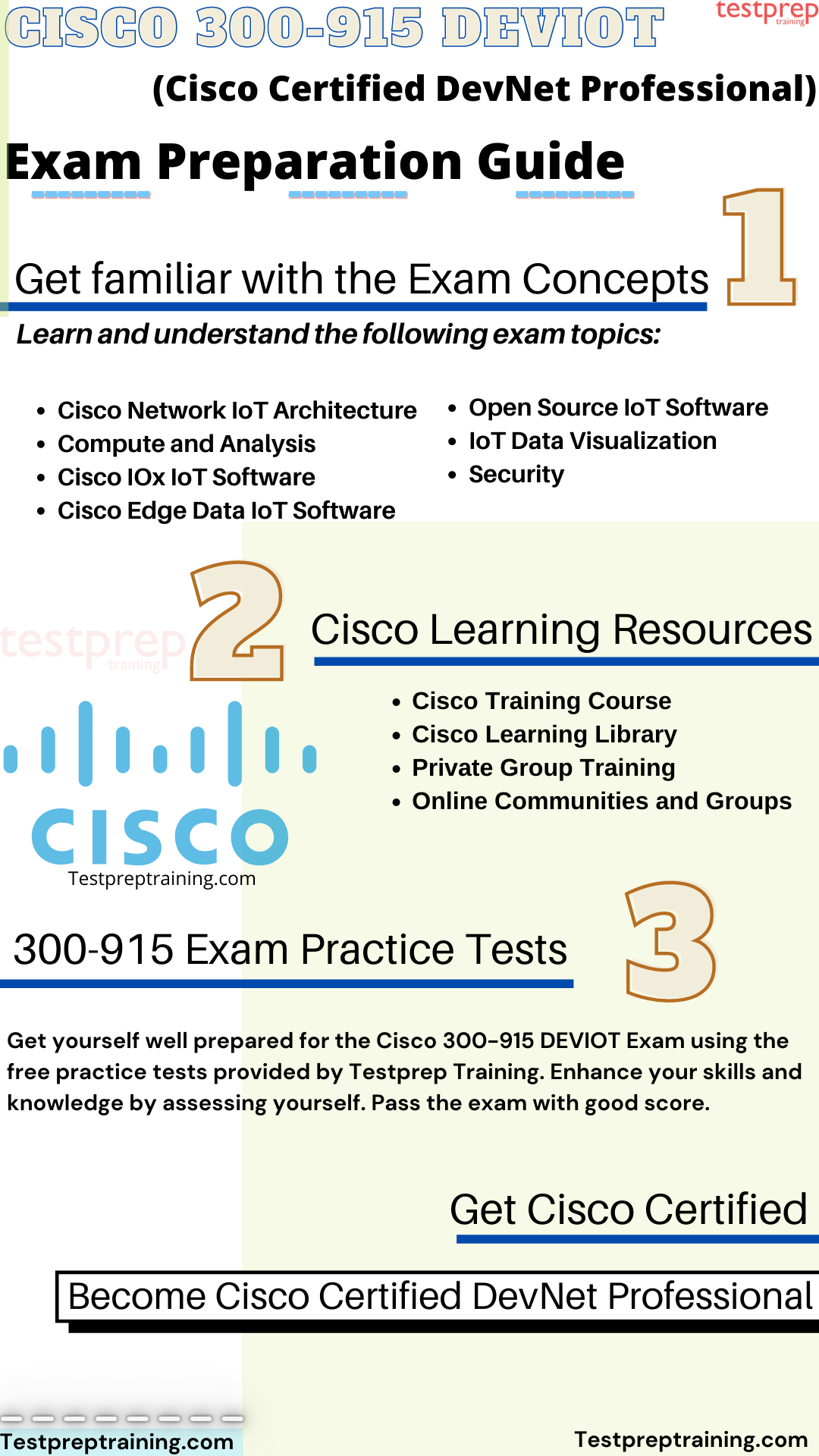
Official Cisco training
Cisco provides an official training course to help candidates prepare for the 300-915 DEVIOT exam that is, Developing Solutions Using Cisco IoT and Edge Platforms (DEVIOT) v1.0 course. This course helps candidates to develop knowledge in the Internet of Things (IoT) applications for Cisco® IoT edge compute and network architecture. With the benefit of both lessons and hands-on experience, candidates will learn to implement and deploy Cisco IOx applications using Cisco Field Network Director and Cisco Kinetic. Further, this includes designing, deploying, and troubleshooting edge applications, and understanding the use of management tools.
Cisco Learning Library
Learning Library to help candidates in gaining foundational knowledge and skills for all network needs. Cisco Learning Library for DevNet is an online DevNet certification training program that helps candidates to explore new opportunities in application design, software development, and automation. Moreover, this technical training library provides full-length interactive DevNet certification courses, with labs, and reference materials. It also gives candidates access to the Cisco Technical Knowledge Library for best practices, design guides, and live webinars.
Private Group Training
Cisco gives candidates access to Private group training that brings the Cisco classroom experience anywhere, whether it’s an office, or to an offsite location of your choice. This can deliver Cisco courses anywhere, from certification classes to the latest technology and business transformation training. Moreover, Private group training is a convenient, cost-effective choice for groups with many people who all need the same training.
Online Study Groups
Online study groups and communities provide benefits to candidates during the exam preparation time. These groups will help you to stay connected with the other people who are on the same pathway as yours. Moreover, here you can start any discussion about the issue related to the exam or any query. By doing so, you will get the best possible answer to your query.
Practice Tests
Practice tests are important during the time of preparation. That is to say, by assessing yourself with these tests you will know about your weak and strong areas. Moreover, you will be able to improve your answering skills that will result in saving a lot of time during the exam. And, the best way to start doing practice tests is after completing one full topic as this will work as a revision part for you. So, make sure to find the best practice sources.

